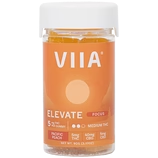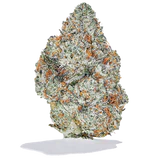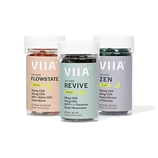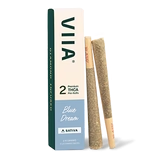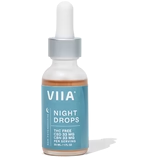 cbd, cbn
cbd, cbnWhat is the Difference Between CBD and CBN?

Post Medically Reviewed By
Dr. Denise Foster
We live in a golden age for cannabis, where we're no longer limited to just CBD (cannabidiol) and THC (tetrahydrocannabinol) products — the primary cannabinoids.
With more research on the potential benefits of the cannabis plant and its active compounds, we're offered even more choices in minor cannabinoids, one of the popular options being cannabinol (CBN).
What is CBN Exactly?
CBN has a growing reputation as a sleep cannabinoid with very similar effects to CBD.
In this article, we'll take you through the similarities and differences between CBD and CBN to help you choose between the various cannabis compounds now available with a click of a button.
Key Takeaways:
-
CBD and CBN are cannabinoids derived from the hemp plant, each with unique effects and benefits.
-
CBD has been widely researched and is known for potential benefits like seizure control, mood regulation, pain management, and sleep support.
-
CBN, while lesser-known, is gaining attention for its possible sleep support properties, anti-cancer effects, and appetite stimulation.
- Proper dosing, timing, and product choice play crucial roles in maximizing the benefits of both CBD and CBN.
- VIIA Hemp offers high-quality of CBD and CBN products, allowing individuals to explore and tailor their hemp wellness journey.
What is Cannabidiol (CBD)?
Sometimes, the best way to understand something new is to compare it to something more familiar, but if you're new to CBD, let's start at the beginning.
Cannabidiol (CBD) is one of the main cannabinoids found in cannabis plants that don't produce psychoactive effects. People from all walks of life use CBD products for wellness and personal care.
CBD and other cannabinoids interact with the endocannabinoid system, which regulates various physiological and psychological processes. This system comprises endogenous cannabinoids (endocannabinoids, or compounds that mimic plant cannabinoids and are naturally produced by the body), receptors, and enzymes.
Through this interaction, cannabinoids like CBD can influence functions such as mood, appetite, pain response, sleep, and immune/inflammatory system responses, helping to maintain the body's internal balance or homeostasis.
CBD Effects
Unlike THC, famous for its psychoactive effects or the “high," CBD doesn't have such psychoactive properties, making it more appealing to customers who want to experience the potential health benefits from the cannabis plant but without risking intoxicating effects. Some of the benefits of CBD use may include:
-
Calming effects: Many people use CBD products to achieve a sense of calm and relaxation to manage everyday stress.
-
Support Normal Inflammatory Function: Preliminary studies suggest that CBD helps to maintain normal inflammation levels in the body, which may help those with chronic pain or post-workout recovery [1, 2].
-
Support Sleep: CBD doesn't have sedative properties like sleeping pills that suppress the central nervous system. Instead, it's believed that CBD may help with sleep due to its mind and body relaxation properties that allow people to fall asleep and stay asleep throughout the night.
- Potential Neuroprotective Properties: Some research suggests CBD might help protect the brain through its potential antioxidant effects, but more research is needed to support this finding [3].
While the research on CBD is exciting, these findings are still considered part of the early stages, and the FDA hasn't approved any over-the-counter CBD product to cure, mitigate, or treat any condition.
It's also normal to have varying responses to CBD as everyone's endocannabinoid system and level of health are different.
Factors like dosing, method of consumption, individual body chemistry, and the type of CBD product used can also influence how CBD might make you feel.
What is CBN?
CBN stands for cannabinol, and it's considered a minor cannabinoid because it's found in very small concentrations in the cannabis plant (less than 0.1%), but it can be found in higher concentrations when growers can breed cannabis plants with the right genetics.

CBN doesn't start as CBN in a cannabis plant — It's a byproduct of THC degradation, which occurs when aged cannabis plants are exposed to oxygen and heat. This means older cannabis or cannabis sativa plants that have been exposed to the elements will generally have higher levels of CBN.
CBN Benefits:
Compared to CBD and even THC, CBN is a relatively new cannabinoid to enter the spotlight, meaning it has minimal research surrounding it.
With that being said, there are some reported health benefits associated with cannabinol, which include:
-
Potential Sleep Support: One of CBN's most frequently discussed uses is for sleeping. However, this is often a debated topic as some studies suggest CBN doesn't have strong sleep-inducing effects, and others show it might make some users drowsy when combined with cannabinoids like THC and CBD [4, 5]. It may have similar sleep-supporting effects as CBD by calming the mind and body to prepare for rest. CBN is showing promise as a sleep aid because it supports deeper and longer REM sleep with fewer sleep disturbances through the night [A, B].
-
Mild Psychoactive Reactions: As a byproduct of THC breakdown, CBN has been shown to have a very weak connection to the CB1 receptors, the same receptors responsible for the high associated with cannabis use from THC. Because the connection is so weak, regular doses of CBN don't tend to produce psychoactive effects. However, large doses may result in mildly psychoactive reactions.
-
Potential Appetite Stimulant: Similar to THC, CBN may have some appetite-stimulating properties observed in animal studies [6].
- Potential Anti-Cancer Effects: CBN is being investigated for some surprising anti-cancer effects. In animal studies, CBN has been shown to reduce tumor progression by stopping cancer cell growth and causing the cancer cell to commit suicide, a natural process known as apoptosis [C, D, E]. Future studies will continue to investigate the role of CBN as a potential cancer therapeutic.
We can expect more research on the potential medicinal properties of CBN to emerge as the popularity of minor cannabinoids continues to grow.
Even still, many people find that integrating products like CBN gummies, oil, and CBN vape concentrates into their wellness routine has benefited their sleep patterns and general sense of well-being.
Main CBD and CBN Differences: Cannabinoid Comparison
The world of cannabinoid therapy is becoming more diverse, with CBD and CBN being just two of the many compounds in the cannabis plant. Though they share similarities to other cannabinoids, the two have distinctive traits.

CBN and CBD Origin and Production
CBD is found naturally in significant amounts in the cannabis plant, especially in hemp varieties, whereas CBN forms as THC degrades from oxidation. CBN is abundant in aged cannabis plants or specialized genetically-selected cannabis plant strains.
Psychoactive Potential
Even in extremely high doses, CBD will not produce the same type of intoxication as cannabis products that are high in THC.
While CBN is generally considered non-psychoactive in very high doses, CBN may produce feelings of euphoria and changes in perception similar to THC. But because you need such high doses to achieve these effects, CBN products aren't typically used for this effect.
Research Landscape and Medical Benefits
The interest in CBD's potential therapeutic benefits without THC's intoxicating effects has led to numerous scientific studies over the past several years. These studies have explored everything from CBD's potential anti-inflammatory properties to its role in seizure control [F], pain relief, and mood disorders.
Compared to CBD, CBN research is sparse despite being a known and recognized cannabinoid for quite some time. Current research on CBN primarily investigates its ability to produce mild psychoactive reactions and affect the quality of sleep and anti-cancer effects.
Availability on The Market Place
CBD's widespread recognition and the federal legal status of hemp plants have resulted in a booming marketplace. You can find a wide range of CBD products in the United States, from oils to gummies, creams, and pet products.
Traditionally, CBN had a more niche presence in the market or could only be experienced in conjunction with full-spectrum CBD products, which maintain the cannabis sativa plant's near-identical composition of cannabinoids and terpenes.
Only recently have we seen more specialized CBN products emerge as people better understand how cannabinoids interact with the body's endocannabinoid system and the safety profile of these compounds.
Which One Should I Choose? Cannabidiol vs. Cannabinol
If you're shopping for hemp products on the market and are overwhelmed with many new options, we're here to help. Keep in mind that these aren't recommendations for medical conditions but observations based on available research and personal accounts of use.
CBD vs. CBN for Sleep
Both cannabinoids show potential for supporting sleep.
- Many people seem to find beneficial effects when using a combination of CBD and CBN for sleeping.
- Though not as extensively studied as CBD, preliminary research and user testimonials seem to support CBN's potential as a sleep enhancer.
- When choosing CBD and CBN for sleep, you may want to consider individual factors like body chemistry, specific sleep challenges, and personal preferences.
- CBD and CBN may exhibit enhanced effects when taken as part of a full-spectrum product rather than in isolation.
- Full-spectrum cannabis extracts contain a range of cannabinoids and terpenes from the plant. This phenomenon, known as the "entourage effect," posits that these compounds work synergistically, amplifying each other's effects. For sleep, this could mean a more profound and restful slumber.

CBD vs. CBN for Pain Relief
CBD shows more potential benefits for pain relief.
Chronic or acute pain can significantly impact the quality of life. As the search for alternative and holistic pain relief solutions intensifies, cannabinoids like CBD and CBN have gained traction as natural options.
There's definitely more research investigating CBD's mechanisms at supporting comfort through interactions with the CB2 receptors, which may help to modulate pain signals and lessen them.
When it comes to CBN, its primary reputation isn't necessarily pain relief. However, CBN does show similar anti-inflammatory effects that may help to address certain types of pain [G].
CBD vs. CBN for Stress
CBD may be best suited for stress.
CBD again wins in the research department on mood and stress effects, largely attributed to interactions with the endocannabinoid system and serotonin receptors in the brain [7].
CBN's potential in stress management is still being explored. However, many people attest to its relaxing properties. For some, CBN is a more desirable option for managing their stress and overall mood — it all comes down to personal preference.
CBD vs. CBN for Appetite
CBN has been found to have appetite-stimulating qualities.
Appetite regulation is a complex dance of hormones, neurotransmitters, and psychological factors.
Some studies suggest that CBD can act as an appetite suppressant. However, its primary role is in appetite normalization rather than outright stimulation or suppression [8].
CBN, in contrast, is gaining attention for potentially stimulating appetite. It might play a role in increasing food intake, making it of interest to those looking to boost their appetite. Preliminary studies and anecdotal evidence hint at CBN's potential as an appetite stimulant, making it distinct from CBD [9].
Considering the "entourage effect," where cannabinoids can enhance each other's benefits, a combined intake of CBD and CBN might offer a balanced approach to appetite. While CBN might stimulate appetite, CBD could ensure it doesn't swing to extremes.
How to Use CBD vs. CBN Products

CBD and CBN products come in various forms, each tailored to specific preferences and needs.
Tinctures/oils, for instance, offer a direct and quick absorption route when taken sublingually (under the tongue). They're perfect for those who want to control their dosage precisely, making adjustments drop by drop as needed.
On the other hand, edibles, such as gummies or chocolates, provide a tasty way to consume these cannabinoids, although they may take longer to produce effects due to digestive processing.
Topical applications, like creams or balms, are designed for localized relief, targeting areas like sore muscles or irritated skin.
Then there are capsules, which provide a no-fuss, consistent dosage method, great for those always on the go.
CBD and CBN can be consumed similarly, with oils and gummies being the most popular forms. While the base compounds differ from brand to brand, their consumption methods are typically consistent. For instance, if you're using oil, you should place a few drops under your tongue, whether CBD or CBN, for faster absorption.
Timing / Dosages for Sleep
CBD and CBN offer potential benefits for those looking to improve sleep quality.
When using these products for sleep, taking them about an hour before bedtime is advisable to allow the compounds to take effect.
As for dosage, starting low and gradually increasing until the desired effect is achieved is always best. Typically, it’s best to allow at least 3 days or 3 nights at one dose before deciding whether to adjust your dose up or down. Three days of consistent dosing of any cannabinoid should allow for gentle stimulation of the endocannabinoid system and allow you to identify any negative effects that you may feel from your dose.
While CBN might require a slightly higher dose due to its low affinity to bind with the CB1 receptor, you should start to feel its calming properties when your dosing is right for your body, just as CBD dosing largely depends on an individual’s body chemistry and the potency of the product.
Approaching Pain Management with CBD and CBN in Cannabis
For pain, the method of application of any cannabinoid can play a pivotal role.
Topicals can provide direct relief to specific areas without systemic effects because topical products do not cross through the skin into the bloodstream. Tinctures or capsules can address more systemic pain concerns that may also involve inflammation and mood as these delivery methods distribute the cannabinoids throughout the body, where they will have their beneficial effects.

As with sleep, starting with a modest dose and adjusting based on relief is crucial. Those with chronic pain have suggested consistency in usage might yield the best results. But generally, these compounds are safe to take on an "as-needed" basis.
Balancing Mood and Well-Being
When it comes to mood regulation, consistency and patience are key.
Whether dealing with daily stress or seeking overall support for well-being, introducing CBD or CBN into one's wellness routine can be a game-changer.
Taking the product at the same time daily can help establish a rhythm. Dosage adjustments should be made gradually, paying close attention to one's physical, emotional, and psychological responses.
The Takeaway: CBN and CBD Exploration
There's never been a better time to access and experiment with different hemp-derived compounds, such as CBN and CBD, with various online products.
CBN and CBD, derived from the cannabis family, have unique effects and benefits catering to various needs. Whether you're familiar with hemp-based products or are just starting, understanding these compounds allows for a more personalized approach to your hemp journey, aligning with individual wellness goals.
For a wide range of CBD and CBN products and to explore their potential benefits, visit the VIIA Hemp shop.
Resources:
- Argueta, D. A., Ventura, C. M., Kiven, S., Sagi, V., & Gupta, K. (2020). A balanced approach for cannabidiol use in chronic pain. Frontiers in pharmacology, 11, 561.
- Rojas-Valverde, D. (2021). Potential role of cannabidiol on sports recovery: a narrative review. Frontiers in Physiology, 12, 722550.
- Campos, A. C., Fogaça, M. V., Scarante, F. F., Joca, S. R., Sales, A. J., Gomes, F. V., ... & Guimarães, F. S. (2017). Plastic and neuroprotective mechanisms involved in the therapeutic effects of cannabidiol in psychiatric disorders. Frontiers in Pharmacology, 269.
- Corroon, J. (2021). Cannabinol and sleep: separating fact from fiction. Cannabis and cannabinoid research, 6(5), 366-371.
- Bonn-Miller, M. O., Feldner, M. T., Bynion, T. M., Eglit, G. M., Brunstetter, M., Kalaba, M., ... & Hennesy, M. (2023). A double-blind, randomized, placebo-controlled study of the safety and effects of CBN with and without CBD on sleep quality. Experimental and Clinical Psychopharmacology.
- Chakravarti, B., Ravi, J., & Ganju, R. K. (2014). Cannabinoids as therapeutic agents in cancer: current status and future implications. Oncotarget, 5(15), 5852.
- Blessing, E. M., Steenkamp, M. M., Manzanares, J., & Marmar, C. R. (2015). Cannabidiol as a potential treatment for anxiety disorders. Neurotherapeutics, 12(4), 825-836.
- Pinto, J. S., & Martel, F. (2022). Effects of cannabidiol on appetite and body weight: A systematic review. Clinical Drug Investigation, 42(11), 909-919.
- Farrimond, J. A., Whalley, B. J., & Williams, C. M. (2012). Cannabinol and cannabidiol exert opposing effects on rat feeding patterns. Psychopharmacology, 223, 117-129.
- Saleska, J. L., Bryan, C., Kolobaric, A., D’Adamo,C. R., Colwell, C., Loewy, D.,Chen, J., & Pauli, E. K. (2023) The safety and comparative effectiveness of non-psychoactive cannabinoid formulations for the improvement of sleep: A double-blinded, randomized controlled trial. Journal of the American Nutrition Association, DOI: 10.1080/27697061.2023.2203221
- Gannon, W., Bronfein, W., Jackson, D., Holshouser, K., Artman, B. E., Schestepol, M., ... & Rudnic, E. M. (2021). Novel formulation of THC and CBN in a repeat-action tablet improves objective and subjective measurements of sleep. American Journal of Endocannabinoid Medicine, 3(1), 12-18.
- Leelawat, S., Leelawat, K., Wannakup, T., Saingam, W., Khamthong, N., Madaka, F., Maha, A., Pathompak, P., Sueree, L., & Songsak, T. (2022). Anticancer activity of Δ 9 -tetrahydrocannabinol and cannabinol in vitro and in human lung cancer xenograft. Asian Pacific Journal of Tropical Biomedicine, 12(8), 323.
- Zhong, N., Li, D., Wang, B., Kovalchuk, O., & Kovalchuk, I. (2023). Cannabinol inhibits cell growth and triggers cell cycle arrest and apoptosis in cancer cells. Biocatalysis and Agricultural Biotechnology, 48, 102627.
- Munson, A. E., Harris, L. S., Friedman, M. A., Dewey, W. L., & Carchman, R. A. (1975). Antineoplastic activity of cannabinoids. Journal of the National Cancer Institute, 55(3), 597–602.
- Reddy, D. S. (2023). Therapeutic and clinical foundations of cannabidiol therapy for difficult-to-treat seizures in children and adults with refractory epilepsies. Experimental Neurology, 359, 114237.
- Wong, H., & Cairns, B. E. (2019). Cannabidiol, cannabinol and their combinations act as peripheral analgesics in a rat model of myofascial pain. Archives of Oral Biology, 104, 33–39.



